TIDAL WAVE: Tulane washes away 15-point USC lead to win Cotton Bowl
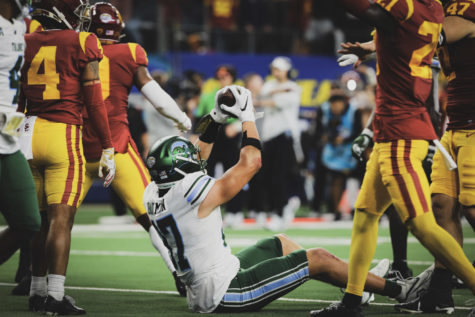
Tulane University is a football school.
Behind the legs of Tyjae Spears, in the hands of Alex Bauman and the continued clutch performance of the Greenie defense, the Green Wave came back to drown the 11-time national champion Southern California Trojans in the final minutes of the 87th Goodyear Cotton Bowl Classic. The 46-45 victory allowed the Wave to culminate its most profound season ever with its biggest win ever as No. 9 ranked Tulane finished in the AP Top 10 for the first time since 1998.
Tulane football has seen its fair share of the wrong side of history — for instance, when the university decided to leave the SEC in 1966 and nearly shut down its football program entirely on two separate occasions. However, it should come as no surprise that the Wave pulled off a miraculous 15-point comeback with less than 4:30 remaining to complete the biggest single-season turnaround in college football history: from 2-10 to 12-2.
A year earlier, Hurricane Ida devastated the Gulf Coast and forced all of Tulane Athletics to relocate to Birmingham, Alabama days before the Wave was to face the Oklahoma Sooners in the season opener at Yulman Stadium. They instead traveled to Norman, Oklahoma and were defeated 40-35 in a valiant effort against current USC head coach Lincoln Riley’s Sooners. The move to Birmingham, combined with a number of key injuries sustained throughout the course of the season, kept the Green Wave at bay for the remainder of 2021. But the Olive and Blue roster, loaded with 18 starters from last season, knew their potential as they headed into 2022.
“That wasn’t our best foot forward. We all knew we were a better team than what we showed,” linebacker Dorian Williams said. Williams earned Defensive Most Valuable Player honors after a sensational 17 total tackle performance. Spears, who was named the Cotton Bowl’s Offensive Most Valuable Player after rushing for 205 yards and a New Year’s Six bowl-record four touchdowns, echoed William’s sentiment. “It’s time to hold each other accountable. I think that’s the biggest thing going from last season to this season,” Spears said. “And we hold Coach Fritz accountable on some occasions, too … That’s the respect level that we have for each other.”
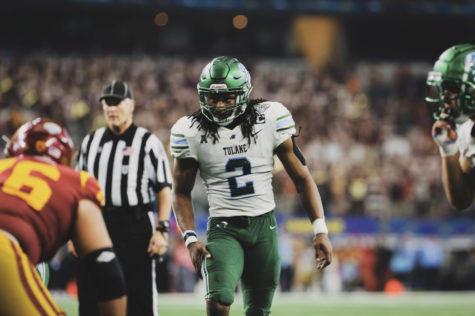
The Wave not only rebounded but also had a season that will never be forgotten around Uptown. Before students stormed the Yulman Stadium field following December’s American Athletic Conference championship win over University of Central Florida, the team already had three impressive road wins under their belt. In September, the Wave beat current Big 12 champion Kansas State and then beat the Houston Cougars in overtime with a third-string quarterback under center. In November, the Wave took down the Cincinnati Bearcats in a thriller that gave the Greenbacks’ their first win over ranked competition since 1984 and notched Tulane’s first 10-win regular season since 1998.
But no stage this season equaled that of the Cotton Bowl between the Wave and the Trojans. While Tulane and USC squared off in home and home contests in 1942 and 1946, this was the most significant meeting between the two since the 1932 Rose Bowl, Tulane’s first ever appearance in a major bowl game. “I told these guys, this was revenge for the ’32 game,” Tulane head coach Willie Fritz said. “They didn’t know what the heck I was talking about.” USC won 21-12 that day to claim a national title, but 91 years later the Wave’s Trojan horse prevailed.
“USC is a big team, a great team … Shout-out to Caleb [Williams]. He’s a great quarterback and everything,” Wave receiver Jha’quan Jackson said. “But we didn’t let that faze us … that’s the main thing we did all year and everything, focus on us.”
Williams, quarterback of the Trojans and recipient of this season’s Heisman Trophy, did not disappoint against the Green Wave. The mesmerizing second-year player connected with 10 different receivers, totaling 462 yards on 37-for-52 passing and broke a plethora of Cotton Bowl records along the way including a record five touchdown passes. Despite Williams’ brilliant performance, he was left helpless on the bench in the game’s final moments.
The tide began to turn on the Trojans late in the fourth quarter. Following a Tulane fumble with less than 11 minutes to play, the Men of Troy chewed clock, drove down the field and kicked a field goal to extend their lead to 45-30.
With all odds stacked against them, the Green Wave offense remained calm and collected as they trotted onto the field with 4:30 remaining, determined to keep rolling the way they had been since before the season even started.
It took just 16 seconds for the Wave to get back into the game. In two plays, quarterback Michael Pratt found receiver Duece Watts for a 59-yard reception that brought the ball all the way to the USC 4-yard line and on the next play, Spears bullied his way into the end zone for a score.
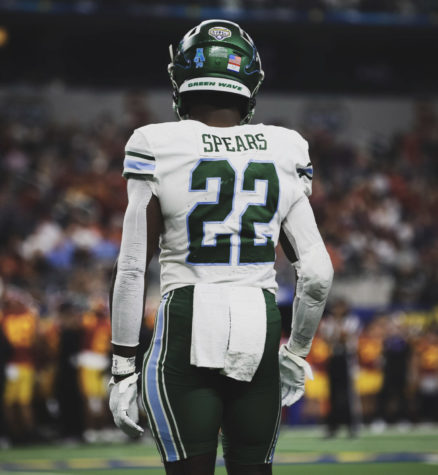
After dropping numerous balls that could have led to scores throughout the game, the Trojans experienced their most consequential drop of this season. It did not come from the arm of Williams but instead the leg of Tulane kicker Valentino Ambrosio. After Ambrosio booted the ball downfield, it slipped through the hands of USC receiver Mario Williams — a fumble that immediately bounced out of bounds and pinned the Trojans at their own two-yard line.
Just as they had up to this point in the season, the Green Wave’s defense shined when it mattered most. Two plays after USC failed to field the kickoff, Tulane defensive lineman Patrick Jenkins exploded through USC’s offensive line to bring down running back Austin Jones in the end zone for a safety and two points. In less than a minute-and-a-half of game time, Tulane managed to cut its deficit from 15 to 7 points. They now had their most important drive of the season ahead of them — and somehow — 3:13 to work with.
The Wave’s final drive did not start on the right foot. A sack on quarterback Michael Pratt lost 11 yards, but Tulane continued to fight and gained 15 yards with runs from Pratt and Spears to set up fourth and six. Pratt rolled left and scampered 8 yards to give the Wave a new set of downs only to find themselves in another fourth down situation a few plays later — this time the Wave needed 10 to move the chains. Tulane converted its second fourth down play of the drive when Pratt connected with Alex Bauman for a 24-yard gain, moving the ball to the USC 30-yard line with 25 seconds left.
After a spike, Pratt hit Watts for another 24 yards on a play that ended with head-to-head contact between Watts and USC defender Bryson Shaw. The contact gave both teams time to regroup as the ball rested on Tulane’s 6-yard line with 18 seconds left.
Two plays later, true freshman tight end Alex Bauman made the most important catch in the history of Tulane Football. After dropping a pass from Pratt on the play before, the two connected in the end zone for a 6-yard touchdown score that was initially ruled incomplete. “Pratt put a perfect ball where I can make a play on it,” Bauman said. “And kept my hand under the ball and scored. I knew right away that I scored.”
When video replay overturned the initial ruling, the Green Wave side of AT&T Stadium erupted. The Green Wave’s rally could not have happened without the support of their fans who stuck with the program over decades of turbulence. Of the 55,329 in attendance in Arlington, Texas, a noticeable majority donned Olive and Blue rather than Cardinal and Gold.
“We were driving into the stadium and they were on the streets and hollering and yelling,” Fritz said. “I thought our crowd was extremely loud and into it the whole time today.”
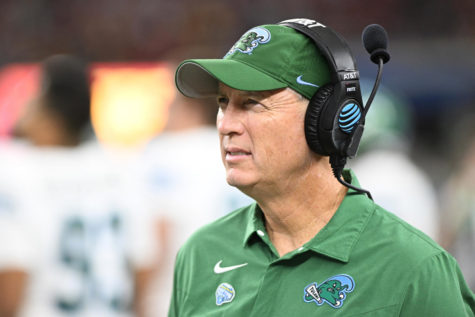
Coleman Dupre and Roland Szubinski are members of Tulane’s 1974 graduating class. Both were members of the historic Wave team that beat LSU in 1973 and both attended the game. “There wasn’t a dry eye in that whole section. When they called that touchdown good, and then we made the extra point, the tears were flowing down everybody,” Dupre, the record holder for longest kick return in school history, said.
“Probably the two best days of my football time at Tulane was the time [we] beat LSU in ’73, that day, and then that day we won the Cotton Bowl,” Szubinski said.
Tulane’s victory was just as unforgettable for current students. “You could feel it in the air that everyone was holding their breath and praying for this comeback,” Tulane senior JP Lisi said. “When we heard it was a touchdown, just like everyone went insane. Everyone went crazy, throwing their drinks everywhere, everyone’s screaming. Like everyone I was with started crying … I know that is going to be with me for the rest of my life … That was just unreal.”
The win not only changed how current students feel about Tulane football — it shifted the perception of Tulane’s program nationally. As Jenkins said following the game, “We’re a football school. Not a smart school. We’re a football school and a smart school.” After winning its first major bowl game since the 1935 Sugar Bowl — the first edition of the historic bowl game — the narrative that the Wave cannot compete with bluebloods, or even ordinary Power Five teams, has been squashed. With Fritz, the Bobby Dodd Coach of the Year recipient, recently announcing he will return to Tulane next season, and with the new talent the Green Wave has been able to recruit, nothing is out of the realm of possibility going forward.
“Finishing ninth, now it’s not a joke. We are now known as a football school,” Lisi said. “And this season 100% cemented that. It’s not a joke anymore.”
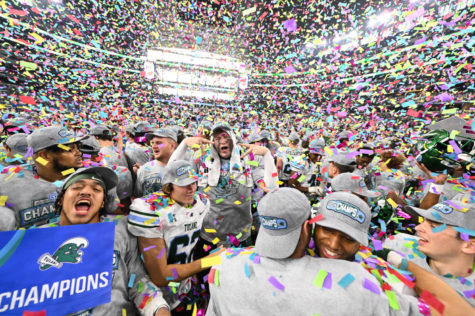
Your donation will support the student journalists of Tulane University. Your contribution will allow us to purchase equipment and cover our annual website hosting costs.


